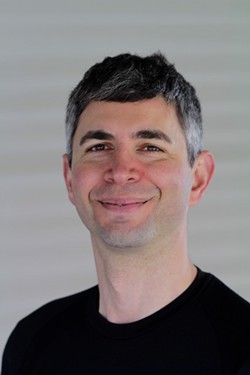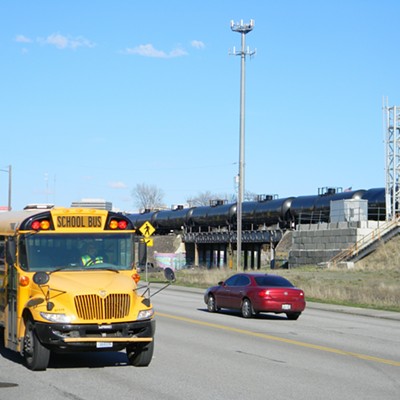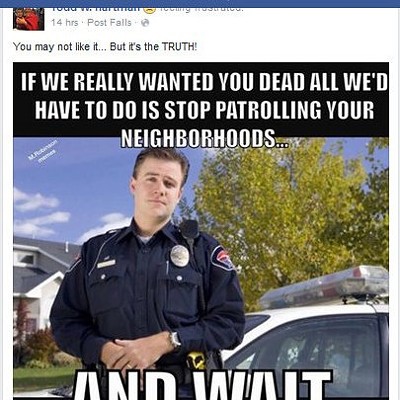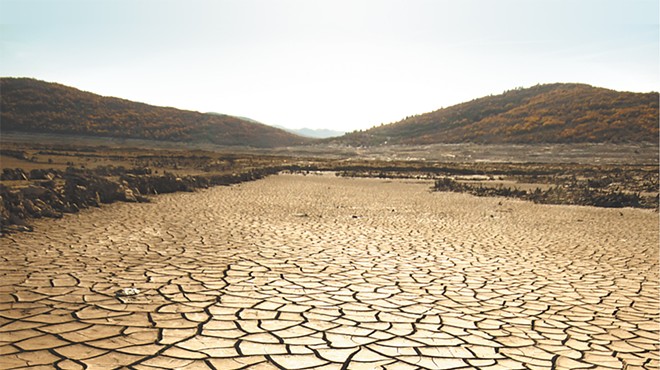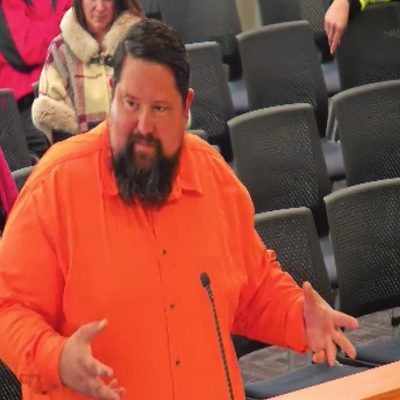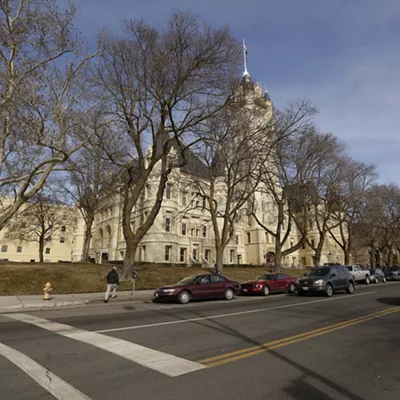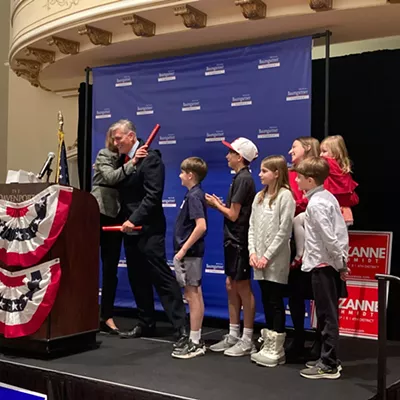Tuesday, July 19, 2016
Q&A with Yoram Bauman, economist behind carbon tax initiative
Yoram Bauman says that I-732, a ballot initiative that he helped author, could be a significant step towards solving one of the world’s most seemingly intractable problems. At the same time, he says if it passes it won’t be a big deal for most the state.
I-732, a ballot measure that will be considered by Washington state voters in November, would place a $25 tax on every metric ton of carbon pollution in the state. The idea behind it is that by making carbon emissions more expensive, businesses will emit less and look for cleaner forms of energy. However, any revenue from the tax would be offset with tax breaks, making the measure revenue neutral (although the legislature’s Office of Financial Management disputes that).
The initiative is modeled after an existing policy in British Columbia and includes a special tax rebate for low-income households. However, a coalition of progressive groups remain opposed to the measure, arguing that any revenue from a carbon tax should be used to invest in clean energy and vulnerable populations. The coalition has also taken issue with how the initiative has been crafted to appeal to more right-leaning constituencies.
Bauman, a “stand-up economist,” was recently in Spokane to pitch the measure to the Association of Washington Business. While in town, he talked to the Inlander about the politics and economics behind I-732. His remarks have been edited.
Inlander: You’ve really stressed that it’s revenue neutral. Why is that so important?
Yoram Bauman: We think that the way to get action on climate change and make it more of a bipartisan issue is to abstract it from the question of, 'Is government too big or too small?' We are changing what we tax instead of how much we tax. I think revenue neutrality is important as a way to appeal to conservatives, to Republicans, to people who are starting to care about climate change but have small government tendencies.
When this initiative was being created were there conversations about using it to fund something like the McCleary decision (which mandates basic school funding)?
There was some discussion about that, sure. I think the problem with McCleary is what is the nexus between a tax on carbon and funding for education. A carbon tax could generate maybe $2 billion a year. McCleary is maybe $5 billion.
Education will be here forever. Carbon tax revenue will hopefully decline in 50 or 100 years.
Why do this at the state level?
Global climate change is a global problem. It would be best to do it at an international level but there are struggles with that.
There are problems tackling it at the national level, partially because of opposition from folks at the U.S. Chamber of Commerce. The point of state-level action is not to quote-unquote solve climate change. The point is to demonstrate that it’s possible to tackle climate in a smart way that works for growth and helps businesses and households. That’s been the experience in British Columbia that’s had something similar since 2008. They instituted a carbon tax and they cut income taxes. I-732 uses the carbon tax revenue to cut sales taxes and have a low-income family rebate that benefits low-income households, plus there is a reduction in business taxes for manufacturers. It’s a smart way forward.
Might it be a problem to not have infrastructure set up for renewable energy first?
It’s a little bit of a chicken and egg problem. Look, some folks are going to have to pay more for fossil fuels. I drive a car, you drive a car. I fly on airplanes. We are going to have to pay a little bit more for that. But we’re going to cut the sales tax on the other side. That will allow businesses to balance their bottom line while creating this financial incentive that’s going to drive decisions that are more sustainable.
If this passes what will life be like for average people in Washington state?
It’s not going to be all that different from what it’s like right now. I’m always amazed that when I meet folks from British Columbia how many of them don’t know that British Columbia has this world-leading carbon policy. It looks like this huge thing but it’s changing less than 10 percent of the state tax system.
For most households, we have this carbon tax calculator on our website. You can go in and plug in your details and see. But most folks will pay a few hundred dollars more for fossil fuels and a few hundred dollars less for everything else. They’ll pay for home heating and a little bit less for books and furniture and computers and clothes and eyeglasses and everything else. For most households, it will be plus or minus a few dollars.
What households will be affected differently?
It depends on how much you buy and how much you pay in sales tax. If you fly a lot or if you drive a lot then you might end up paying a little bit more. If you’re in a household that doesn’t spend money on anything but gas and electricity and home heating and you don’t qualify for the working-family rebate, you’ll probably lose a little bit. There are some households that will probably come out ahead.
Have you done any studies on how this initiative might affect Western Washington compared to Eastern?
Folks in Eastern Washington, the evidence is that they drive farther but they tend to combine trips in ways folks in Western don't. I think it’s pretty close to a wash in terms of driving. Probably folks in Western Washington might fly a little bit more. I think that the big difference is not so much between Western Washington and Eastern Washington, but if I was going to pick one big geographic issue is whether you are getting electricity from an investor-owned utility or a public utility district.
The PUDs tend to have a lot more hydropower. The investor-owned utilities have more fossil fuels in their portfolios, so they are going to have a higher carbon price. So that’s not a Western Washington versus Eastern Washington issue.
There are some groups that seem like they’d be natural allies like Fuse Washington, but are opposing it. How big of a deal is that politically?
We think that when we get our message out that we have a moral obligation to do something on climate change and I-732 is a good way to make our tax system more fair. It’s too bad it’s been tied up in politics, especially on the left side of the political spectrum. Somebody emailed me the other day saying that the left has a natural propensity to form a circular firing squad and I-732 has been the recipient of some of that.
So you think you can overcome some reluctance from left-wing groups with support from the center and center-right to put you over the top?
Sure. But we’re not giving up on the left. People on the streets say this is a great policy: You’ll help people with a low-income family rebate and reduce sales taxes and tackle climate change. It’s awesome. That’s how we got 350,000 signatures last year.
You were here to meet with the Association of Washington Business. How’d that go over? What did you tell them?
We were asking for their endorsement for initiative I-732. It’s kind of a long shot with the conservative business community. But our pitch was it’s better than some of the alternatives out there and it’s better than nothing because climate change is a threat and we have a moral imperative to take action and we think initiative I-732 is an economy-friendly, business-friendly, family-friendly way to do that.
When Gov. Jay Inslee introduced his carbon-reduction rule, the AWB sent out a statement saying they thought there were problems with it. Did they have any ideas?
Let me be generous in saying this meeting was not about generating ideas. More generally, I can say it’s been a challenge for the business community getting to “yes” because their general framework has been “no.”
The overarching problem for the business community and for conservatives in the Republican Party, in general, is what do you do? You can spend a bunch of time talking about how climate change isn’t really real and it isn’t a threat. Then at some point you have to recognize it is real and it is a threat and we have to something about it. I think a lot of these folks understand that climate change is real, I think they understand humans are contributing to it and it’s a threat to our economy and way of life and the sticking point is what are we going to do about it.
Being so close to Idaho, we hear all the time that if you put more regulations on businesses they’ll go to Idaho. Will they?
Well, first of all, we are lowering business taxes for manufacturing. Second, we are lowering sales tax. Businesses pay about a third of the sales tax in the state. The attitude of the business community in British Columbia is grudging acceptance. And we think that we’ll see a similar result here.
What do you make of Inslee’s effort to reduce carbon emissions?
I think as an economist it’s not as elegant or economical as I-732, but I understand that the governor has tried to pass legislation and that has failed and he’s seeing what he can do. I think they would be complementary.
Have any conservatives endorsed the initiative?
We have one of the signers of our voter's pamphlet, Bill Finkbeiner who was a conservative in the legislature for 14 years and was Republican majority leader. We have an endorsement from Howard Behar, former president of Starbucks. Getting anybody to agree on a centrist policy on anything, but something like climate change, in particular, is hard.
Are there alternatives?
Well actually, right now, there are no alternatives out there. Right now, there is a lot of talk about another measure that a group called the Alliance for Jobs and Energy is working on supposedly. They keep saying they are going to come out with something but we’ll see what the details are.
Tags: Yoram Bauman , Carbon Washington , News , Image

